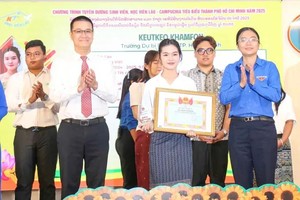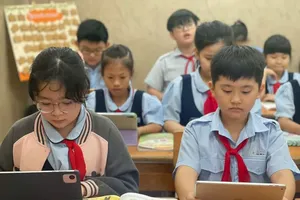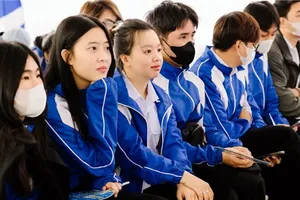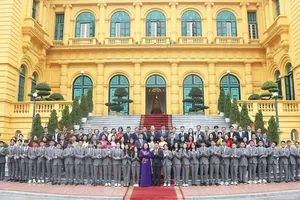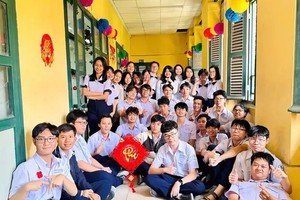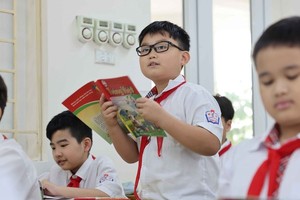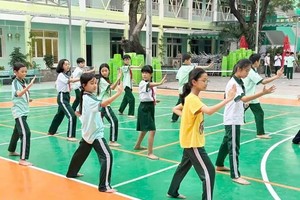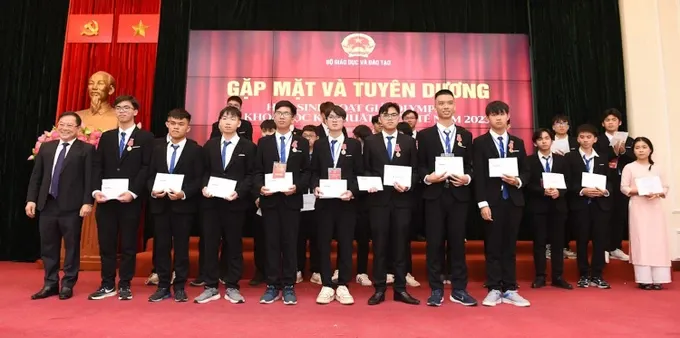
Famous figures like Hoang Le Minh, Dam Thanh Son, Le Ba Khanh Trinh, Le Tu Quoc Thang, Ngo Bao Chau, or Le Anh Vinh have proved the high teaching quality of Vietnam compared to the world. Yet adopting a suitable method to avoid brain drain and make better use of these gifted people is a challenge to the country’s leaders.
Dinh Cao Son – first year student at Hanoi National University of Education – is one in the Top-10 Outstanding Vietnamese Young People 2023. Being the only student on the list, he has obtained impressive achievements from international contests like his gold medal in the International Chemistry Olympiad 2023.
He recalled that when in his 10th grade, he had encountered various obstacles learning Chemistry; yet, the support from his classmates and devotion of his teacher in Ha Tinh High School for the Gifted helped him overcome the difficulties. He now opts to be a chemistry teacher to pass the passion for this subject to next generations of students.
Statistics from the Education Quality Management Agency (under the Ministry of Education and Training) reveal that in the last 5 years, 174 Vietnamese students, most of whom come from high schools for the gifted, have taken part in international and regional Olympiads in the fields of Maths, Chemistry, Physics, Biology, Informatics. They have won 54 gold, 68 silver, and 40 bronze medals in total, along with 8 certificates of merits. For many years, Vietnam has stably stood in the list of Top-10 countries with excellent results.
In the nomination list for the Top-10 Outstanding Vietnamese Young People 2023, there are three students, all of whom have achieved high results in global contests. Sadly, only Dinh Cao Son decided to develop his career domestically, while the other two selected foreign universities to pursue their degrees and then started working in other nations.
Similar stories can be found with winners of famous national talent contests. They earn a scholarship to obtain their tertiary degrees in international universities and begin their careers there as well. Only a small number consider coming back to Vietnam to work.
One such devoted figure is Prof. Dr. Le Anh Vinh, who earned his doctorate degree from Harvard University (the US) and becomes the youngest professor in Vietnam when he was only 37 years old. Being a student at Natural Science High School for the Gifted (under the University of Science – Vietnam National University-Hanoi, he received a full IT scholarship from New South Wales University (Australia), followed by his pursuance of the doctorate degree in Harvard University. In October 2011, he decided to come back to Vietnam and has been a lecturer in the University of Education (Vietnam National University-Hanoi).
Other remarkable persons who have displayed their commitment to their fatherland are Dr. Hoang Le Minh – the first Vietnamese to win a gold medal in the International Mathematics Olympiad 1974, Dr. Le Ba Khanh Trinh – winner of a gold medal in the International Mathematics Olympiad 1979.
A quick survey among domestic universities shows that less than 20 percent of current professors, doctors, and management officials have received training in other countries. Since most have experienced the domestic educational environment only, the tertiary teaching methods at Vietnamese universities cannot keep up with those at develop nations. Some experts in the fields even commented that there is a serious lack of connectivity between secondary and tertiary levels in the country, leading to a weaker ability to produce highly skillful human resources to contribute to the national development.
Deputy Director Mai Tan Linh of the Education and Training Department of Da Nang City said that 10 years ago, the city launched a project to send excellent students to other countries for training. Sadly, the project results were not as expected since many selected learners would rather pay back the fees in order to stay in other nations than coming back to Vietnam to work after studying. This is because the job opportunities and salaries for these people do not match their previous learning efforts. That is not to mention the working environment is not truly favorable to them.
Da Nang City also considered school fee exemption to students at Le Quy Don High School for the Gifted, yet the applicable financial mechanism does not allow that, which is quite a pity!
H.T.T.H, a former teacher from Le Hong Phong High School for the Gifted, shared that many alumni of her school still keep in touch with one another via chat groups on social network platforms. When there is a community project or a school activity, they are willing to provide support. Obviously, it is these enthusiastic alumni that help to spread the fame of high schools for the gifted and connect to foreign professionals. However, there should be more support policies to encourage the participation of this valuable resource in the activities of their old schools.
Prof. Dr. Le Anh Vinh – Chairman of the Vietnam National Institute of Education Sciences – said that one of the most concerns of talented people when coming back to their fatherland is the working and research environment, including infrastructure, financial conditions, an available research community. This means material benefits are not the only factor affecting their decision to work in Vietnam or not.
To maximize the intellectual resources of young scientists, it is necessary to synchronously deploy solutions for financial investment, infrastructure upgrades, human resources development, open legal mechanisms so that these scientists can develop to their fullest.









